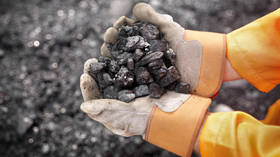US carbon emissions lay waste to poorer countries – study

The US caused nearly $2 trillion in damages to other nations from 1990 to 2014 with its massive carbon footprint, according to a new analysis conducted by researchers from Dartmouth College and published in the journal Climatic Change on Tuesday.
The prodigious amount of greenhouse gases released by the US over the 24-year period has led to heatwaves, crop failures, and dire economic consequences for other nations, resulting in $1.9 trillion in lost income globally, the report found.
The top five carbon emitters, including China, Russia, India, and Brazil (in addition to the US), have in total caused economic losses of $6 trillion since 1990, the researchers claimed – a figure representing about 14% of global GDP.
“It’s a huge number,” lead author Chris Callahan pointed out, adding that while it was “not surprising that the US and China are at the top of that list,” the figures the research unearthed “really are very stark. For the first time, we can show that a country’s emissions can be traced to specific harm.”
The top 10 largest emitters cause more than 67% of economic losses related to climate and reap 70% of the financial benefits, the researchers found, with the US alone responsible for 16.5% of losses and 18% of benefits. This pattern is replicated throughout high-emission countries, which the analysis found are doing the lion’s share of damage while experiencing little to none of the resulting economic suffering.
If anything, the researchers pointed out, the most northerly countries are reaping tangible benefits from climate change, such as longer growing seasons and fewer cold-related deaths. Nor did the research factor in non-GDP-related harms, such as loss of biodiversity and natural disaster deaths, indicating that the disproportionate harm befalling poorer and warmer countries is likely even more skewed.
Callahan and his colleagues arrived at their conclusions by combining historical climate data with climate models and economic information, then calculated resulting damages “using empirical temperature-growth relationships.” When emissions created by international trade are taken into account the US is placed even more starkly in the lead regarding climate-induced damages, responsible for 18%. The damages caused by Russia and China correspondingly decrease by 15% and 9%, respectively, while those caused by some European countries increase by as much as 20%.
The researchers noted that their work could provide a basis for poorer countries to sue for climate-related harms, pointing out that previous efforts have been hamstrung by a lack of scientific evidence linking individual carbon emitters to “the downstream impacts of warming.” With the kind of evidence presented in their report, they argued, those countries may be able to take legal action. Such methods of placing blame for climate harms can also be applied to individual corporations, the researchers point out.
Such conclusions are sure to be controversial, with US climate chief John Kerry already engaged in damage control in the hope of avoiding “opening up some legal track with respect to [climate-related] liability.” While he insisted on following the COP26 climate conference that backed the idea of compensating poorer countries for losses and damages, he has shied away from the “issue of liability,” presumably trying to avoid having the US entangled in any potential climate lawsuits filed by the poorer countries it has allegedly victimized.













